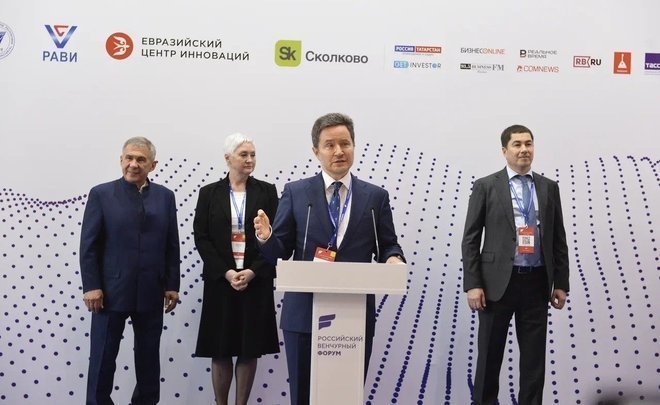Kirill Kayem: ‘Now the estimates of startups value are more sober, but the shortage of money has not gone anywhere’

"40-50% of investments in Russian venture projects were made by foreign funds. Now this “niche” has been freed up, and together with this, we will get rid of the elements of overheating of startups, when an investor could name any price," Kirill Kayem, the senior vice president for innovation of Skolkovo Foundation, predicted changes to the venture market. Over the past year, venture capital investments in Russian startups have fallen to $1,1 billion, and the first signs of market recovery are expected next year. Why the model of investing by state funds has not caught on and in which niches technological startups will be of interest to new wave investors — the leaders of technological entrepreneurship discussed at the plenary session of the Russian Venture Forum in Kazan.
Russian venture capital market has shrunk
The Russian Venture Forum was opened with pomp on 16 March on the territory of Kazan Expo, which brought together more than 3 thousand participants — representatives of Russian foundations and leading players of technological entrepreneurship. About two hundred institutional and private investors attended the forum in search of new projects, said Igor Gladkikh, one of the organisers, the deputy head of RVC JSC.
Suffice it to say that the selection of projects for participation in the exhibition was accompanied by high competition. There were 6 candidates for one place. Out of 317 submitted applications for the jury's examination, only 51 technology companies “broke through”. Nevertheless, the exhibition was dominated by startups of Tatarstan universities and IT companies: for example, KNRTU-KAI presented a training programme for UAVs.
“Traditionally, the exhibition of innovative companies is organised on this site, meetings and discussions on topical issues are held. We will try to make your stay at the forum useful and interesting," Rustam Minnikhanov, the rais of Tatarstan, welcomed the participants of the forum.
However, the mood of venture investors cannot be called elevated. For the first time in the last 6 years, the Russian venture capital investment market has shrunk.
Over the past 10 years, the global market has grown 13 times — up to $650 billion. However, a lot has changed in 2022, the stock market froze, shares of high-tech companies sank by more than 30%, the forum participants lamented.
The geopolitical situation has changed the picture: if in previous years promising startups regularly appeared, a variety of investors invested in venture funds, now the difficulties have affected them as well. At the same time, investments are also declining in certain sectors of the European and US economies.
According to the Russian Venture Investment Association, 130 venture funds were present in the country in 2022, half of them worked with foreign capital. Now these funds are gone.
“This year, we will stay at the same level”
The main investment trend in 2022 was biotech, which attracted $119 million. The second in terms of investment was the sphere of transport and logistics — $44 million, as well as e-commerce — $41 million.
“Geopolitics pushed the withdrawal of private capital and froze the activity of many corporations. The drop was so severe that it reached a 6-year low. This year, we will remain at the same level," predicts Aleksey Basov, managing partner of BSF.
The expert connects it with the split in the venture market, when some are going to foreign countries, others are gaining a foothold in the Russian market, occupying vacant niches. “Everyone should make a choice — with whom he sees the prospect of development," he said. According to him, this trend will determine the venture capital market this year — those who remain will conclude more deals, occupying empty niches.

Then a discussion unfolded about why the model of venture financing with state funds did not take root.
“This is a huge risk for the portfolio, not for a specific startup. This process will not end, so many state funds that have been launched have not even started investing, they are afraid of becoming subject to criminal liability," explained Arseniy Dabbakh, the founder of the analytical platform.
According to him, the public-private funds that were launched required long investments that did not allow them to compete with private capital, so they did not get into interesting deals, did not have time and could not invest in foreign startups.
When will the market bounce off the bottom? At the end of the year we will see a positive, next year will be even more positive. But a lot depends on how quickly the military operation finishes.
“The optimistic outcome has a national-political connotation," Kirill Kayem, the senior vice president for innovation of Skolkovo Foundation, summed up.
According to him, many are now starting to come back: “Now it is a great time to invest in startups, the average check has fallen decently — almost 3 times in the investment environment. This means that the valuation of startups has decreased by 40%, an element of overheated value, when it was possible to name any price and it was difficult for an investor to bargain. “Now the estimates of startups value are more sober, but the shortage of money has not gone anywhere.”
Among the market niches that will lead in terms of investment, he singled out fintech and industrial technologies.